Top 10 Most Important Events in American History
America, the beautiful, the Land of the Free. Which were your finest moments, and which were your darkest? This list is going to dive deep into our largest losses, biggest gains, and anything else significant.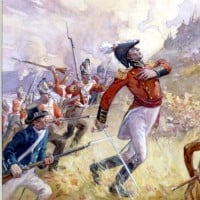
The American Revolution was the war fought between 1775 and 1783, through which 13 of Great Britain's North American colonies threw off British rule to establish the sovereign United States of America, founded with the Declaration of Independence in 1776. The American Revolution seemed to be a one-way battle, as the Americans had an army of farmers, at best, facing the world's most powerful army at the time. So, what hope did they have? Almost none, and yet they prevailed. Imagine a world with no United States. Many theorize that this was divine intervention because how does this happen without a God?
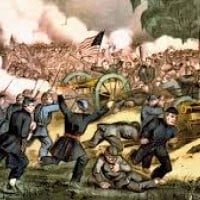
If someone made the case that the Civil War was even worse than 9/11, they'd be right. Both were horrible events, don't get me wrong, but 9/11 was nothing in terms of length or casualties. In total, the Civil War had 254,000 deaths - 94,000 on the battlefield and 164,000 disease-induced deaths. Not to mention, it lasted roughly four years. We know it was predominantly fought over slavery, but it was also fought by some just to save and unite the (then not-so) United States.
Its reward was greater than anything else. Although it cost thousands of men on both sides' lives, plus the life of Abraham Lincoln, we abolished slavery and united our nation.
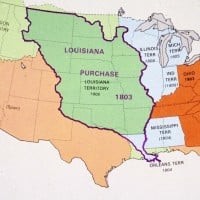
The Louisiana Purchase was more important than you may think. Yes, it bought what we now know as Louisiana (hence the title). But the Louisiana Purchase also included Iowa, Missouri, Arkansas, the Dakotas, most of Kansas, Oklahoma, Montana, Wyoming, half of Minnesota, and more.
France had owed a lot of debt to the U.S. at the time, so Thomas Jefferson made a deal with France. If he bought that land, he'd drop all of France's debt, which was roughly $15 million. This doubled the size of the United States in the process.
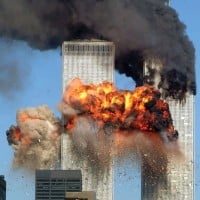
We all know the story of the September 11 attacks, or simply 9/11. Unlike the Moon Landing, this event was, is, and always will be viewed with sorrow. We can fairly say that a total of 2,977 Americans died on September 11, 2001.
When the first attack happened, we all assumed it was an accident. But when the second of the Twin Towers got hit, roughly twenty minutes later, we knew: America was under attack. Later in the day that is seared into our minds, the Pentagon was partly destroyed via airplane. A group of brave men and women, having put two and two together, either saved the Capitol Building or the White House. This day was also the harbinger of the "No-Fly List" that President George W. Bush created. This day was chosen by Bin Laden because that's what we Americans dial for emergencies: 911.
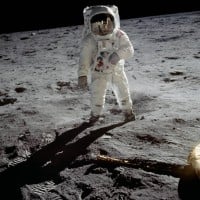
Whether you think it was a hoax or not, I don't know, but let's put aside that potential dilemma for now. This was huge for the United States because the Space Race between the United States and (surprise) Russia was much more important than you may think. Whichever nation got a man on the moon first basically got the right to say they're superior to the alternative. Not only does that mean the USA is superior to Russia by that logic, but the United States will always have the reputation as the first nation to put a man on the moon.
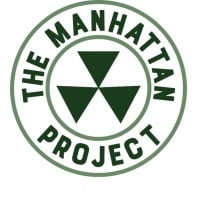
The Manhattan Project actually has nothing to do with Manhattan. It was the code name for the worldwide attempt to be the first nation to make an atomic weapon. In the United States, the attempt was orchestrated by Robert Oppenheimer, who got nicknamed "the Father of the Atomic Bomb." He was indeed one of the many harbingers of the atomic age, along with other big names such as Albert Einstein. They and many more successfully created the first atomic bomb, nicknamed "the gadget." It was not until Harry Truman took over after FDR passed away that we made our achievement known with finalized bombs nicknamed "Little Boy" and, three days later, a bomb nicknamed "Fat Man."
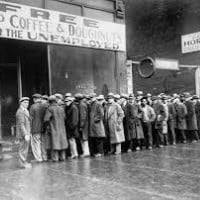
The Great Depression was actually a worldwide phenomenon, but let's focus on the United States, as the United States was the first nation to be affected by it. The Great Depression started a decade commonly referred to as "the dirty '30s," with a stock market crash causing massive unemployment, poverty, lost opportunities, despair, and much more. I honestly hate to admit it, but FDR may have done a decent job reducing collateral damage, where Herbert Hoover failed. However, the recovery was not 100% FDR's "New Deal." World War II played a big hand in our recovery, as well as ultimately saving the world from Nazi Germany.
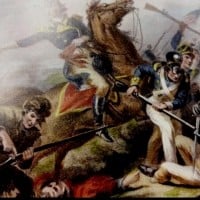
The War of 1812 was kind of like a second Revolutionary War. It was the United States versus Great Britain, again, but this time, both sides had allies. We had France on our side, whereas Great Britain had Ireland and a couple of Native American tribes in their pockets. This was mostly over territorial grudges, although it was also about trade because Great Britain was our biggest trade partner, receiving 80 percent of American cotton and 50 percent of all other American exports. The War of 1812's origin is not 100% clear, as there were lots of other, more devastating wars, so the War of 1812 was pretty close to forgotten.
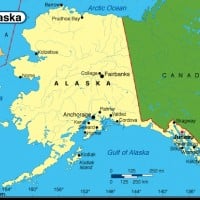
Alaska is much more important to the United States than we give it credit for. Up until the United States bought Alaska, shortly after the Civil War, Russia had made its presence known in North America through that large patch of land. As history has shown us, over and over again, Russia and the United States have a rivalry. Buying Alaska from Russia was, at the time, considered a huge mistake, but let's consider what it would be like if Russia was always in the backyard of the United States and next door to Canada. Spying would skyrocket. This was brilliance on behalf of William Seward.
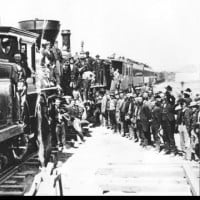
May 10, 1869. Its importance was, of course, the ability to travel quickly across the country. It also opened up many more markets for manufacturers in the East. Commerce.
Tied the West to the East and opened up faster communication with the telegraph and telephone.
This is the war that made the United States into a world power that could rival the powers of Europe (Great Britain, France, Germany, Italy, Russia, Turkey, and Austria). It brought down the last remnants of New Spain.
The United States and Japan became the first non-European powers in the modern era. It convinced the rest of the world that non-European countries can rival the European powers.
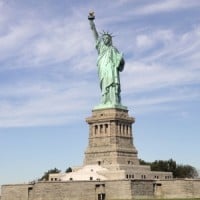
The Statue of Liberty was originally dedicated to the United States in honor of the Declaration of Independence. Lady Liberty was designed by Frederic Bartholdi, and her face was modeled after that of Bartholdi's mother. Although President Grover Cleveland was against it, he presided over the dedication of the Statue of Liberty.
The Statue of Liberty is right by Ellis Island, where many immigrants entered the United States. America's version faces the sea because France has a smaller version. It was kind of poetic to make them look at each other for eternity. Speaking of poetry, Emma Lazarus wrote the poem on the plaque of Lady Liberty's pedestal. It's called "The New Colossus." This was important because it helped the United States get the title of the Land of the Free and Home of the Brave.
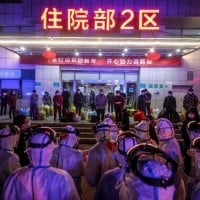
I think this is important for America because it really tested the country's health system and economy.
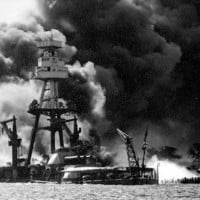
Taught the US to be better prepared for war and attack from anyone. Are the Chinese next?
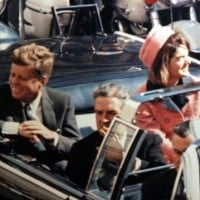
I'm not going to lie, it was idiocy for JFK to come to Dallas without proper security. What was he thinking? It produced plenty of conspiracy theories, among other things.

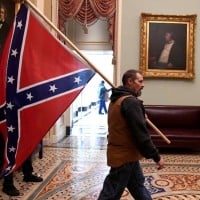
Proved that Trump cannot be trusted and is a traitor to the United States, and never meant to honor his pledge to be loyal to the Constitution.

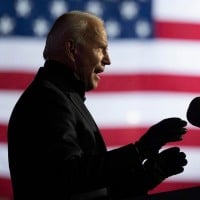
You know, this was in a couple of ways very important. I don't know about "most important," but close. The only president elected by thousands of people and got so much support, yet nobody supports him now. If the United States implodes, it's very possible that it will be due to this individual.
Since it has caused most people to believe democracy is lost, it's fair enough to say so.
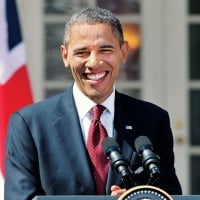
He got elected for having a better temper and personality than John McCain, being modern (using Twitter and whatnot). I'm fairly certain there were a few people who voted for him just because he's Black.
Taught millions of US Southerners that Black folks are smart also, and settled as best can be done the Civil War.
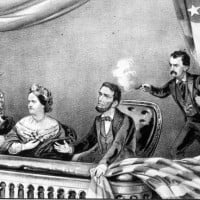
Increased White House security by much. I'd say this actually belongs! Good job!
This is a mostly "swept under the rug" event committed by the United States. The United States is too embarrassed to accept what they did wrong and the horrifying injustices the natives faced.
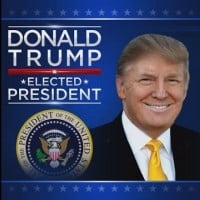
Best economy of the 20th century, and so far, the last non-fraudulent President of the United States. And there's the whole "never held office" factor, and yet he was a way better president than any career politician since Ronald Reagan.


The first declaration of opposition to communism. Although I personally believe starting/continuing the Cold War was a bad idea for the US, it was still very important to US history. Should definitely be higher than the 2021 Storming of the US Capitol.